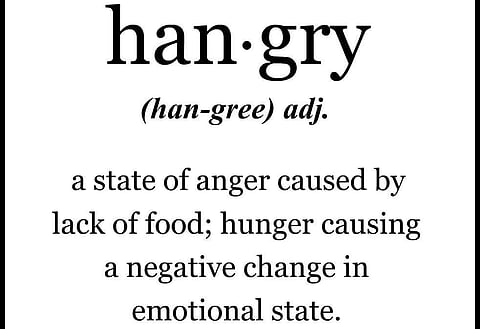

Recently, I read an interesting article titled 'Why do we get hangry?' The study offers an explanation for why you’re not yourself when you’re hungry. The words ‘hangry’ and ‘hanger’ made me read the story with interest. ‘Hanger’ is a blend of ‘hunger’ and ‘anger’.
It is defined as ‘the emotion which erupts when our hunger boils over’. According to the study, hanger is caused by more than just a drop in blood sugar level and can be controlled with the mind-body connection. The research published by the American Psychological Association (APA) states that “a combination of our biology, personality, and environment triggers hanger.”
The adjective ‘hangry’ (a blend of ‘hungry’ and ‘angry’) was added to the Oxford English Dictionary in 2018 though it has been in use for over a decade. Here are some headlines in which the words ‘hangry’ and ‘hanger’ have been used:
What makes us feel ‘hangry’ decoded
Getting ‘hangry’ is a real human emotion
Serious hangry! Grumpy gorilla batters toy in a furious bid to knock
The brain science that explains ‘hanger’
I came across another interesting news report today. The title of the news article is ‘Shashi Tharoor’s ‘webqoof’ moment: Shares ‘FAKE rejection letter to Einstein’ on social media.’ In fact, a year ago, Tharoor used the term ‘webqoof’ in a tweet.
According to the Urban Dictionary, the word ‘webqoof’ refers to ‘a person who believes every word or information on the internet and social media’.
Even highly educated people experience ‘webqoof’ moments when they share fake posts.
He is such a webqoof that he shares all sorts of fake news without verifying their authenticity.
The word ‘webqoof’ is used by the twitterati. Here is an example:
Webqoof: No, Hawking Did Not Say Vedas Are Superior to Einstein
“I don’t like to be mansplained.” What does the word ‘mansplain’ mean? The word is a blend of ‘man’ and ‘explain’. When a man tries to explain something to a woman in a
condescending and patronising manner, the person is said to ‘mansplain’. This word was added to the Oxford English Dictionary in January 2018. Here are some authentic examples from newspapers:
Please don’t mansplain to women about abortion (Herald Review)
This white guy is trying to mansplain Martin Luther King to Martin Luther King’s daughter (www.indy100.com)
Similarly, when white people explain something to people of colour in a condescending manner, they are accused of ‘whitesplaining’. It is also used to refer to the act of someone explaining something to a person who already knows a lot about the subject explained.
I know a lot about the history of our country but this guy is whitesplaining it to me.
Some TV anchors in India always indulge in ‘whitesplaining’.
We are not interested in your ‘whitesplaining’ any longer.
Who coined the term ‘prepone’? It is not known since when the word has been used in India. Claiming that he coined the word ‘preponed’ Shashi Tharoor in a tweet on November 16, 2016 asks the question to the Twitterati: “Any etymologists who can find a source for ‘preponed’ earlier than I claimed authorship circa 1972?” All standard dictionaries label ‘prepone’ as an Indian English term which means ‘to move to an earlier date’.
According to Merriam Webster, the word is widely used by India’s English speakers but is largely unheard outside the subcontinent. Many educated Indians too use the word as the opposite of ‘postpone’.
The conference organizers have decided to prepone the seminar by two days.
It is not a good idea to prepone the meeting.
According to the Oxford English Dictionary, the word was used in the sixteenth century with a different meaning. When it was used in the 1500s, the word had this meaning: ‘to place in front of, to set before’.
